Jennifer Jean Warnes is an American singer and songwriter. She has performed as a vocalist on a number of film soundtracks. She has won two Grammy Awards, in 1983 for the Joe Cocker duet "Up Where We Belong" and in 1987 for the Bill Medley duet "(I've Had) The Time of My Life". Warnes also collaborated closely with Leonard Cohen.
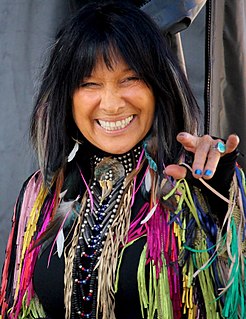
Buffy Sainte-Marie, is an Indigenous Canadian-American singer-songwriter, musician, composer, visual artist, educator, pacifist, and social activist. Throughout her career in all of these areas, her work has focused on issues facing Indigenous peoples of the Americas. Her singing and writing repertoire also includes subjects of love, war, religion, and mysticism. She has won recognition, awards and honours for her music as well as her work in education and social activism. Among her most popular songs are "Universal Soldier", "Cod'ine", "Until It's Time for You to Go", "Take My Hand for a While", "Now That the Buffalo's Gone", and her versions of Mickey Newbury's "Mister Can't You See" and Joni Mitchell's "The Circle Game". Her songs have been recorded by many artists including Donovan, Joe Cocker, Jennifer Warnes, Janis Joplin, and Glen Campbell.

"Can't Help Falling in Love" is a song recorded by American singer Elvis Presley for the album Blue Hawaii (1961). It was written by Hugo Peretti, Luigi Creatore, and George David Weiss and published by Gladys Music, Inc. The melody is based on "Plaisir d'amour", a popular French love song composed in 1784 by Jean-Paul-Égide Martini. The song was initially written from the perspective of a woman as "Can't Help Falling in Love with Him", which explains the first and third line ending on "in" and "sin" rather than words rhyming with "you".

"Mr. Sandman" is a popular song written by Pat Ballard and published in 1954. It was first recorded in May of that year by Vaughn Monroe & His Orchestra and later that year by the Chordettes and the Four Aces. The song's lyrics convey a request to "Mr. Sandman" to "bring me a dream" – the traditional association of the folkloric figure. The pronoun used to refer to the desired dream is often changed depending on the sex of the singer or group performing the song, as the original sheet music publication, which includes male and female versions of the lyrics, intended.

"Kyrie" is a song by American pop rock band Mr. Mister, from their album Welcome to the Real World. Released around Christmas in 1985, it hit the top spot on the Billboard Hot 100 in March 1986, where it was number 1 for two weeks. It also hit the top spot on the Billboard Top Rock Tracks chart for one week. In the UK, the song peaked at number 11 in March 1986.

"I Just Can't Stop Loving You" is a 1987 duet ballad by Michael Jackson and Siedah Garrett, and was the first single released from his seventh album, Bad. The song was written by Jackson, and co-produced by Jackson and Quincy Jones. The presence of Garrett on the track was a last-minute decision by Jackson and Jones, after Jackson's first two choices for the duet both decided against participating. Garrett, a protégé of Jones's who co-wrote another song on Bad, "Man in the Mirror", did not know that she would be singing the song until the day of the recording session. It became her first hit since Dennis Edwards' 1984 song "Don't Look Any Further".
"Universal Soldier" is a song written and recorded by Canadian singer-songwriter Buffy Sainte-Marie. The song was originally released on Sainte-Marie's debut album It's My Way! in 1964. "Universal Soldier" was not an immediate popular hit at the time of its release, but it did garner attention within the contemporary folk music community. It became a hit a year later when Donovan covered it, as did Glen Campbell. Sainte-Marie said of the song: "I wrote 'Universal Soldier' in the basement of The Purple Onion coffee house in Toronto in the early sixties. It's about individual responsibility for war and how the old feudal thinking kills us all."

"Can't Smile Without You" is a song written by Christian Arnold, David Martin and Geoff Morrow, and recorded by various artists including Barry Manilow and the Carpenters. It was first recorded and released by David Martin as a solo single in 1975. The version recorded by Manilow in 1977 and released in 1978 is the most well-known.

"Broken Wings" is a 1985 song recorded by American pop rock band Mr. Mister. It was released in June 1985 as the lead single from their second album Welcome to the Real World. The song peaked at number one on the Billboard Hot 100 in December 1985, where it remained for two weeks. It was released as the band was just about to embark on a US tour opening for Tina Turner. "Broken Wings" became the first of two consecutive number ones of the band on the American charts, the other chart-topper being "Kyrie". Outside of the United States, "Broken Wings" topped the charts in Canada, peaked within the top ten of the charts in Australia, Belgium (Flanders), the Netherlands, Norway, the Republic of Ireland, Switzerland, the United Kingdom and West Germany, and the top twenty of the charts in Austria, New Zealand, Spain and Sweden.

"I Can See Clearly Now" is a song written and recorded by American singer Johnny Nash. It was the lead single from his album I Can See Clearly Now and achieved success in the United States and the United Kingdom when it was released in 1972, reaching number one on the U.S. Billboard Hot 100 and Cash Box charts. It also reached number one in Canada and South Africa. The song has been covered by many artists throughout the years, including a hit version by Lee Towers that reached no. 19 in the Dutch Top 40 in 1982, and another recorded by Jimmy Cliff for the motion picture soundtrack of Cool Runnings that peaked at no. 18 on the U.S. Billboard Hot 100 in 1993.

"Make the World Go Away'" is a country pop song composed by Hank Cochran. It has become a Top 40 popular success three times: for Timi Yuro (1963), Eddy Arnold (1965), and the brother-sister duo Donny and Marie Osmond (1975). The original version of the song was recorded by Ray Price in 1963. It has remained a country-crooner standard ever since.

"Everywhere" is a song by British-American rock band Fleetwood Mac from their 14th studio album, Tango in the Night (1987). The song was written by Christine McVie, who also performed lead vocals, and produced by Lindsey Buckingham and Richard Dashut. In the United States, "Everywhere" was released as the fourth single from Tango in the Night in November 1987, while in the United Kingdom, it was issued as the album's fifth single on 21 March 1988.

"I'm Leaving It Up to You" is a song written by and originally performed by Don Harris and Dewey Terry in 1957. It was later popularized in 1963 by the American duo Dale and Grace, who took it to #1 on the Billboard Hot 100 chart. In 1974, Donny and Marie Osmond reached the top five on the US Hot 100 chart and peaked at #1 on the Billboard Hot Adult Contemporary chart with their cover.
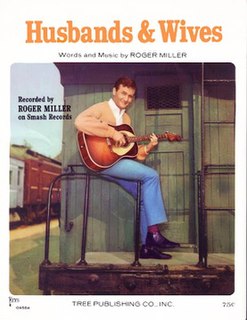
"Husbands and Wives" is a song written and first recorded by American country music singer Roger Miller. Miller's original, from his album Words and Music, was released in February 1966 and was a crossover hit for him, reaching Top Ten on the U.S. country and Adult Contemporary charts, as well as Top 40 on the pop charts. Since the release of Miller's original, the song has been covered by several other artists, including The Everly Brothers, Ringo Starr, Neil Diamond, a duet between David Frizzell and Shelly West, Jules Shear, and Brooks & Dunn, whose version was a number-one country hit in 1998.
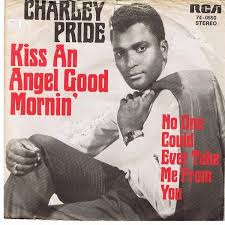
"Kiss an Angel Good Mornin'" is a song written by Ben Peters, and recorded by American country music artist Charley Pride. It was released in October 1971 as the first single from the album Charley Pride Sings Heart Songs. The song has since become one of his signature tunes and was his eighth song to reach number one on the country charts. It was also Pride's only single to reach the Top 40 on the pop charts, peaking at #21 on the Billboard Hot 100, and also went into the Top Ten of the Adult Contemporary charts. It also reached #19 on the U.S. Cash Box Top 100. The song spent four months on the pop chart, longer than any of his other hits. Billboard ranked it as the No. 74 song for 1972.

"Please Mr. Please" is a song written by Bruce Welch and John Rostill, both members of British pop singer Cliff Richard's backing band, The Shadows. Welch had originally recorded the song himself in 1974 with no commercial success.
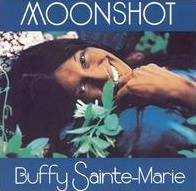
Moonshot is a studio album by Canadian singer-songwriter Buffy Sainte-Marie, released in 1972 by Vanguard Records.
"I Can't Stop Loving You " is a song written by singer-songwriter William Nicholls and first recorded by his short-lived project, White Horse – a collaboration between himself, Kenny Altman, and Jon Lind – and featured on the group's 1977 self-titled album.

"Until It's Time for You to Go" is a song from the 1965 album Many a Mile by Canadian singer-songwriter Buffy Sainte-Marie. Sainte-Marie included a French-language reworking of the song, "T'es pas un autre", on her 1967 album Fire & Fleet & Candlelight. French translation was made by Quebecer songwriter Claude Gauthier.
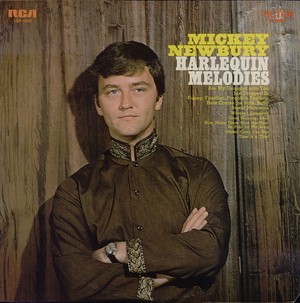
Harlequin Melodies is the 1968 debut album by singer-songwriter Mickey Newbury. Newbury was already a successful songwriter in Nashville, signed by Acuff-Rose Publishing. At one point he had four #1 hits on different charts for Eddy Arnold, Solomon Burke, The First Edition, and Andy Williams, and he had written hits for several others. Produced by Elvis Presley producer Felton Jarvis, Harlequin Melodies concentrates on Newbury's versions of his hit songs; nearly every song on the album has been covered by other artists.
















